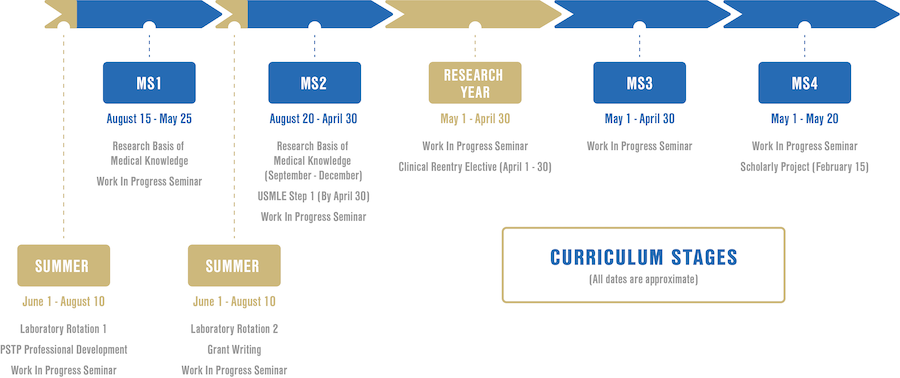
The PSTP curriculum is designed to integrate exposure to research with the high-quality clinical training available at the University of Pittsburgh School of Medicine. You will begin training to become a physician-scientist immediately upon matriculating.
- All Students
-
Work in Progress Seminar
This course meets monthly throughout the year and is designed for all PSTP students. The purpose of this course is to provide each PSTP student a forum to present his or her research and to discuss their research ideas, designs and results, and to give and to obtain peer feedback. Each student has the opportunity to present at all stages of a project, whether it is starting a project, planning the design, analyzing the data, or getting ready to present the results at conferences or in manuscripts. This course encourages all students to engage in scientific discussion and feedback on each project
- Prior to MS1
-
Incoming students are required to spend the summer before the start of medical school rotating in a laboratory of their choice. This affords many benefits, including fostering familiarity with the Pittsburgh research community and establishing a routine prior to the start of medical school. Every effort is made to ensure a meaningful social and academic experience—the program will provide information on the many available labs, organize meetings with potential advisors, plan social outings, and help coordinate logistical arrangements.
To help students further define their research interest, our Professional Development I course offers a broad cross-section of MD-only researchers to interact with the incoming class. Each week, current biomedical problems are examined from the unique perspectives of a variety of disciplines.
Professional Development I
This course is designed for entering PSTP students (Pre-MS1). The purpose of this course is to highlight contemporary questions in biomedicine and how different scientific fields approach these questions. In half of the classes, the students meet with guest physician-scientist faculty to understand the key research question that they investigate, how they have built their career, the overall scientific strategy that the investigator is using to test their hypotheses, and any special methodologies that make the investigation more tractable. Students also learn basic skillsets in research including graphical literacy, biostatistics, and experimental design.
- MS1 and MS2
-
Courses within the medical school follow an innovative problem-based learning (PBL) curriculum, which has become a model for medical education programs across the country. From the first day of medical school, students participate in the Patient/Doctor Relationship Block, which emphasizes patient interviewing, behavioral medicine, and public health policy. During the first year of medical school, multidisciplinary courses incorporate the major aspects of anatomy, embryology, biochemistry, molecular biology, microbiology, immunology, and the fundamental principles of pathology and pharmacology. A clinical and technical skills course is initiated toward the end of the first year and continues through much of the second year.
During the first and second years of medical school, PSTP students enjoy a weekly seminar course titled Research Basis of Medical Knowledge, which provides a bridge between medical school course work and the research breakthroughs detailed in the basic sciences blocks. This class provides a forum for PSTP students to present and review scientific literature among peers, guided by expert faculty.
Research Basis of Medical Knowledge
This small group session is restricted to PSTP and MSTP students during their first year and a half of medical school. The class meets to review primary literature linked to current first- and second-year curricula. Before each session, a faculty member and two students meet and review the paper assigned for that week. Students learn about the research basis of medical knowledge and how to present and critically review primary literature.
In the spring of MS1, the second summer lab rotation is selected with the assistance of the program.
During the summer between MS1 and MS2, PSTP students participate in a second professional development class focusing on grant writing. Students prepare and submit grant proposals to the Howard Hughes Medical Institute (HHMI) in the hopes of receiving funding for their research year. This exposure to the grant writing process presents our students with a unique opportunity to learn how to develop research proposals that can be competitive for external funding.
Grant Writing
PSTP students take this course at the end of their first year of medical school. Career expectations are discussed and framed in the perspective of grant writing and the review process. A small amount of lecture material is linked to a series of workshops, in which each student composes a biosketch, specific aims, experimental plan, and training plan related to their future PSTP research year. Constructive peer critiquing of grant material provides a perspective on which to build grant writing skills.
Preparation for Step I of United States Medical Licensing Examination (USMLE), taken in the spring after the second year, tends to dominate the second quarter of medical school. Several fantastic resources are available to help the students. The Integrated Case Studies course, which emphasizes data acquisition, problem solving, and communication skills, precedes the exam and is taught exclusively in a small group setting to foster discussion about the clinical cases. The discussion about clinical cases helps students anticipate board questions, which currently are presented in a case-based format. In addition, the academic coordinator at the medical school helps with specific advice, reading materials, mock exams, practice questions, and more.
- MS3 and MS4
-
The third and fourth years of medical school include 92 weeks of required clerkships. Elective rotations may include additional research or clinical experiences. All of the core clinical clerkships required for licensure and graduation are completed during the third year of medical school and all elective rotations are completed during early part of the fourth year.
- Transferring to the MSTP
-
PSTP students may elect to apply to our combined degree program, the Medical Scientist Training Program (MSTP). Parallel features of the program permit efficient transfer of credit. A number of PSTP alumni have successfully transitioned to the MSTP.
